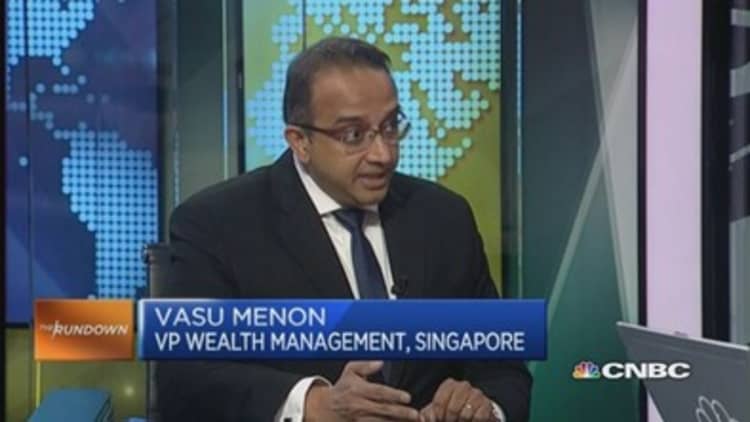
Lee Kuan Yew, the first prime minister of Singapore who governed the nation for three decades between 1959 and 1990, died on Monday at a local hospital at age 91, according to a statement from the prime minister's office.
Addressing the nation on Monday, Singapore's current leader, Lee Hsien Loong, said he was "grieved beyond words" at the death of the man often called Singapore's founder.
The government has declared a period of national mourning until Lee's funeral on Sunday. His family will hold a private wake in the next two days, then his body will lie in state at parliament from Wednesday to Saturday.
Visionary, tenacious and uncompromising, Cambridge-educated lawyer Lee Kuan Yew was recently hospitalized for severe pneumonia. According to observers, he will be remembered for many things, but most of all as the patriarch of modern Singapore who oversaw the transformation of a sleepy port city into a thriving global metropolis within a single generation.
Read MoreLee's most memorable quotes
His passing comes just a few months before Singapore's 50th anniversary of independence in August.

Even as he made way for successors Goh Chok Tong and current prime minister and son Lee Hsien Loong, the elder Lee continued to wield influence on the nation's policies and direction in advisory roles for many years after leaving the prime minister's office.
He held Cabinet positions as senior minister and later minister mentor before resigning from government altogether in 2011.
His death marks the end of a chapter for People's Action Party (PAP)—the party he co-founded—which has governed the country continuously since 1959.
Condolences
Global leaders offered their condolences following Lee's passing.
In a White House statement U.S. President Barack Obama said "[Lee Kuan Yew] was a true giant of history who will be remembered for generations to come as the father of modern Singapore and as one of the great strategists of Asian affairs."
"Lee's views and insights on Asian dynamics and economic management were respected by many around the world, an no small number of this and past generations of world leaders have sought his advice on governance and development," Obama added.
U.K. Prime Minister David Cameron also spoke on Lee's passing.
"Lee Kuan Yew personally shaped Singapore in a way that few people have any nation. He made his country into one of the great success stories of our modern world. That Singapore is today a prosperous, secure and successful country is a monument to his decades of remarkable public service," Cameron said.
"He was always a friend to Britain, if sometimes a critical one, and many British Prime Ministers benefited from his wise advice, including me," he added.
Australian Treasurer Joe Hockey took to Twitter to express his appreciation of Singapore's founding father:
Founding father
Born into a middle-class family on Sept. 16, 1923, when Singapore was still a British colony, Lee was one of five children. He excelled in academics from a young age, attending the prestigious Raffles Institution before studying law at Fitzwilliam College at Cambridge, where he graduated with double first-class honors.
Lee married Kwa Geok Choo, whom he described as his "intellectual equal" and "soulmate," in a secret ceremony in 1947, when they were studying in the United Kingdom. After returning to Singapore in 1950, they married again before family and friends.
Read More Lee Kuan Yew's most memorable quotes
Upon moving home, Lee set up a law firm with his brother and wife, but politics was his true calling.
In 1954, he formed the PAP with a group of English-educated, middle-class colleagues and pro-communist trade unionists, all held together by the glue of anti-colonialism.
Lee's first electoral win saw him become the member of Parliament for the neighborhood of Tanjong Pagar. But the party's popularity grew, helping it clinch Singapore's first general election in 1959.
The PAP won by a landslide, securing 43 of the 51 seats in the Legislative Assembly. This marked the beginning of the party's dominance in Singapore politics.
The man who saw tomorrow
Inheriting an economy with no natural resources and little means for revenue generation, Lee acknowledged that Singapore's primary resource was its people.
He pushed Singapore's low-cost workforce to multinationals and realized at an early stage that corruption had to be eradicated to attract investment.
Lee put great emphasis on the development of the country's infrastructure and education system, which now rank among the best in the world.
After a tense period of social unrest, mostly racially motivated, social cohesion became high on his list of priorities. With the majority of the population living in public housing, the government instituted a racial mix in each block of flats, to ensure a diversity of ethnicities living in close premises.
His policies fueled decades of rapid economic growth, propelling the evolution of the country into a first world nation. Under his leadership, Singapore's gross domestic product per capita multiplied from $428 to $12,766, according to the Department of Statistics.
Lee's successes, however, did not come without a price. The label "nanny state" was often ascribed to Singapore in criticism of the government's micromanagement style.
Harsh penalties put in place for crime during his tenure as prime minister, including mandatory capital punishment for those convicted of drug trafficking as well as tight controls on the media, have drawn controversy. Some of these laws continue to exist, while others have been revised. In 2012, the Singapore Parliament adopted amendments to mandatory death sentencing for drug offenders, allowing judges to impose life sentences in certain circumstances.
While older Singaporeans tend to appreciate Lee's top-down approach, some of the younger generation could not relate to his modus operandi.
Lee, however, has been unapologetic about his paternalistic style of governing the country.
"If Singapore is a nanny state, then I am proud to have fostered one," he wrote in an autobiography published in 2000: "From Third World to First: The Singapore Story 1965-2000."

